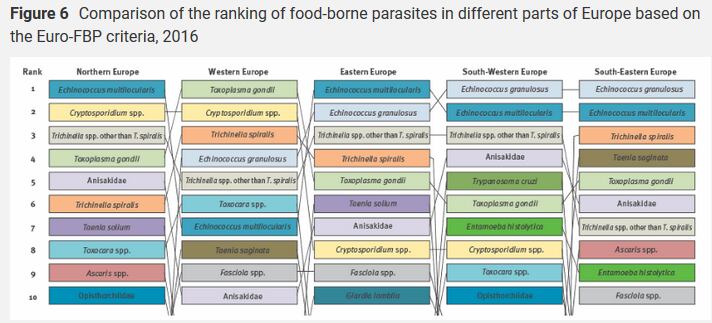Prioritising FBP helps direct health resources and with development of guidelines to control them.
The European Network for Foodborne Parasites (Euro-FBP) work was based on the Food and Agriculture Organization of the United Nations (FAO) and World Health Organisation (WHO)’s 2012 recommendation to repeat global ranking of FBP on a regional level.
A team of 35 European parasitologists ranked FBP in terms of importance for Europe and its regions at a workshop in February 2016 based on a set of criteria.
The multi-criteria decision analyses (MCDA) method, also applied by FAO/WHO, was used as well as two methodologies (direct rating and swing weighting).
E. multilocularis and T. gondii ranking
For E. multilocularis, the criteria ‘geographical distribution’, ‘morbidity severity’, and ‘case-fatality ratio’ contributed to the majority of the ranking score.
It ranked first or second in all regions except Western Europe where it was seventh.
For E. multilocularis, the cause of alveolar echinococcosis, there is a lack of illness cases in some parts of Europe while it is endemic in some countries in Western Europe.
The relatively high severity of morbidity and the case-fatality ratio mainly drove its ranking plus a predicted increase in spread of this parasite within Europe and the threat of future illness.
A low number of illnesses was scored for most FBP considered, with the exception of T. gondii and Giardia, making this criterion not a main determinant.

For T. gondii the ‘number of foodborne illness cases’ and ‘geographical distribution’ gave more than 50% of the ranking score.
T. gondii was considered the top priority in Western Europe and was third to fifth in other regions.
The position of Cryptosporidium spp. and T. spiralis showed the greatest variability among the top-10 ranked parasites within Europe.
Global vs Europe ranking
FBP considered of greatest importance to Europe differed from those listed globally, said researchers.
“This finding reflects important differences in the distribution and public health risks of FBP. The results of this ranking exercise may be used to inform public health decision makers about where resources for FBP surveillance systems might be most usefully directed and also to provide input into developing a research agenda on FBP in Europe.”
Taenia solium ranked first in the global ranking but tenth in Europe.
This is because T. solium is practically absent in Europe but is common in many Asian, South American and African countries.
Parasites ranking second (E. granulosus), third (E. multilocularis) and fourth (T. gondii) at the global level were also among the top four in the European ranking.
The biggest difference was for T. cruzi, ranking 10th globally and 21st in Europe.
Each FBP was scored at least three times - by three different groups - and opinions discussed during a forum.
When FBP-specific data or measurements were not available the selected criteria-levels were based on professional opinions after group discussions.
Source: Euro Surveill. 2018; 23(9):pii=17-00161
“Prioritisation of food-borne parasites in Europe, 2016”
Authors: Bouwknegt Martijn, Devleesschauwer Brecht, Graham Heather, Robertson Lucy J, van der Giessen Joke WB, Euro-FBP workshop participants
